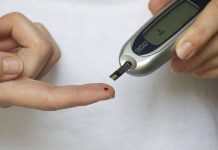Certain symptoms of menopause can increase sweat production, which in turn, can lead to a change in body odor. For example, hot flashes and night sweats are a very common symptom, and can have an effect on body odor.
“Anxiety sweat is produced in the apocrine glands; it is a fatty sweat that breeds and feeds bacteria. This bacteria will create a more pronounced and stinkier odor.”
During menopause, female hormones begin to fluctuate and are at the root of changes in body odor. For example, when estrogen levels drop, it sends a false message to the hypothalamus that the body is overheating. The hypothalamus responds by increasing sweat production; more sweat means more body odor.
Likewise, psychological symptoms such as anxiety, panic attacks, and depression can also lead to physiological changes affecting menopause and body odor. Furthermore, sweating caused by anxiety is different from sweat produced from exercise. Anxiety sweat is produced in the apocrine glands; it is a fatty sweat that breeds and feeds bacteria. This bacteria will create a more pronounced and stinkier odor.

Interestingly, some women undergo a heightened sense of smell during this change of life. So relax, you may be smelling something about yourself that no one else is.
Menopausal changes in body odor are normal, and while it’s usually not medically serious it’s not a change women want to embrace. If menopause and body odor is making your life smelly and uncomfortable, there are a few things you can do to help.
Tips for reducing menopausal body odor:
Bathe daily to remove odor-causing bacteria from your skin.
Use a few drops of essential oil added to your bathwater. Lavender, sage, peppermint, and pine can counteract a strong body odor.
Eat less meat, and avoid onions, garlic, and spicy foods.
Eat less sugary foods; bacteria and yeast feed on sugar.
Include more foods rich in zinc and magnesium, such as shellfish, tofu, broccoli, pecans, and cashews.
Try wheatgrass and other chlorophyll-rich foods; chlorophyll is known as “nature’s deodorant.”
Quit smoking.
Drink less coffee and alcohol.
Drink more water.
“Be sure to also talk to your doctor to rule out any other health conditions that could cause an increase in sweating and changes in body odor.”

Add certain supplements that contain phytoestrogens to your diet. These include black cohosh, soy, and Dong Quai. However, consult with your doctor before taking new supplements.
Sage tea or capsules have been widely used to help reduce hot flashes and night sweats.
Wear loose-fitting, natural fiber clothes, and avoid wearing synthetic fabrics.
Sleep in cotton pajamas and sleep under cotton sheets.
Reduce your stress levels. Yoga and meditation are great ways to relax, as well as a simple stroll in nature can ease anxiety.
Be sure to also talk to your doctor to rule out any other health conditions that could cause an increase in sweating and changes in body odor. For example, developing Type 2 diabetes, is also common in middle-aged women; excessive sweating is an indication of diabetes. Diabetes can also cause a fruity smelling body odor.
Sources & References:
https://www.healthline.com/health/sudden-change-in-body-odor#causes
https://www.webmd.com/menopause/qa/what-alternative-treatments-are-available-for-menopause-symptoms
https://www.webmd.com/skin-problems-and-treatments/qa/whats-the-best-way-to-fight-body-odor





















